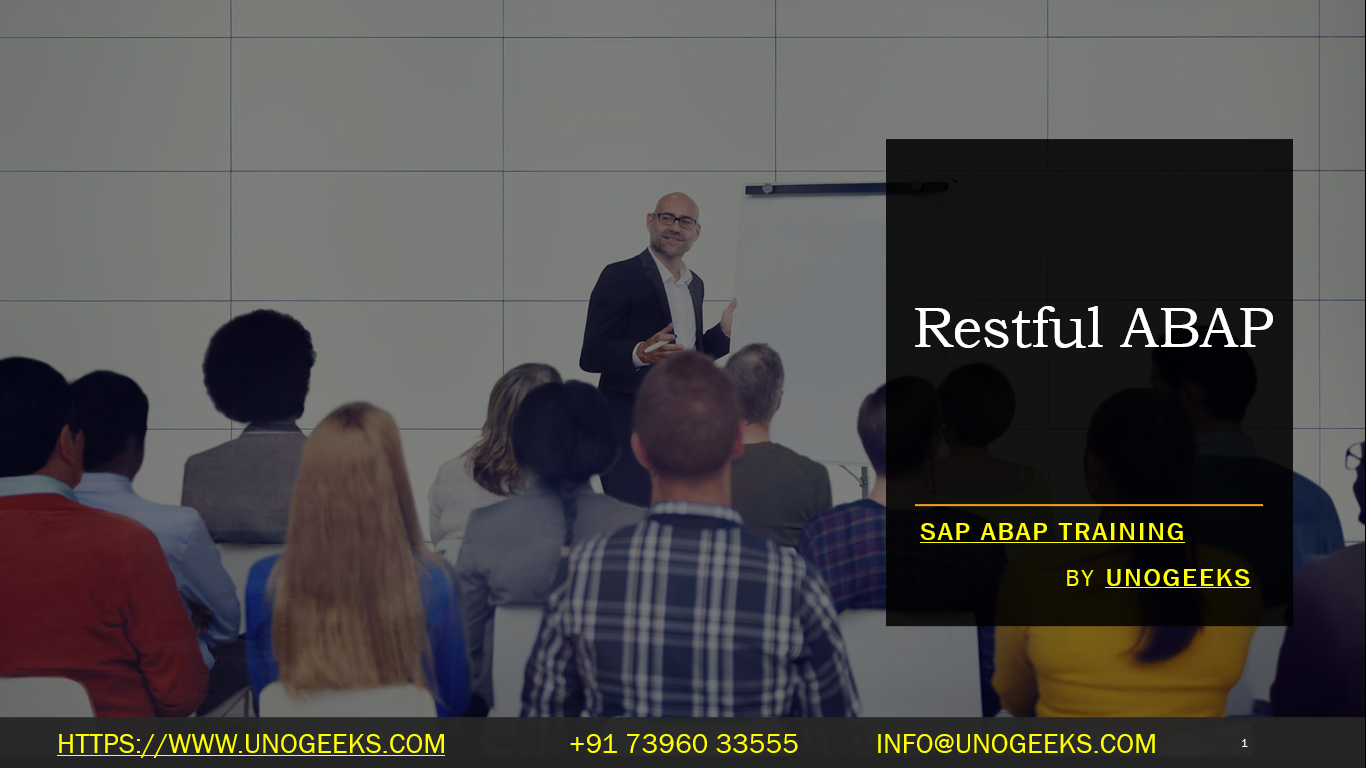Restful ABAP
RESTful ABAP: Modernizing SAP Development with OData Services
ABAP, SAP’s traditional programming language, has evolved significantly in recent years. One of the most important advancements is the ABAP RESTful Application Programming Model (RAP). This framework streamlines the creation of OData services, enabling seamless integration of SAP systems with web applications, mobile apps, and other modern technologies.
What is REST?
- REST (Representational State Transfer) is an architectural style for designing web services.
- It emphasizes the use of standard HTTP methods (GET, POST, PUT, DELETE) to interact with resources on a server.
- RESTful APIs are known for scalability, flexibility, and ease of use.
What is OData?
- OData (Open Data Protocol) is a standardized REST-based protocol.
- It defines best practices for building and consuming RESTful APIs.
- OData simplifies how clients query, create, update, and delete data using a consistent, structured way.
Why use RESTful ABAP (RAP)?
- SAP HANA Optimization: RAP leverages the power of SAP HANA by using Core Data Services (CDS) views for efficient data access and manipulation.
- Fiori Apps and Web APIs: RAP enables the streamlined development of both SAP Fiori user interfaces and general-purpose Web APIs that can interact with diverse client applications.
- Modern Development: RAP aligns ABAP development with contemporary web development practices, enhancing code maintainability and developer experience.
- Simplified Integration: OData makes integrating SAP data with web and mobile apps straightforward.
- Future-Proof: RAP ensures your SAP developments are ready for modern cloud architectures and integration scenarios.
Key Components of RAP
- Behavior Definition: Define the behavior of your service, including CRUD operations (Create, Read, Update, Delete), using behavior definitions (CREATE, READ, UPDATE, DELETE).
- Behavior Implementation: Implement the business logic behind the OData operations in ABAP classes.
- Business Object: The central element in a RAP application, often represented by an underlying CDS view that defines the data structure.
- Service Definition: Expose the business object as an OData service.
- Service Binding: Publish the service, making it accessible to clients.
Getting Started with RAP
- Tools: Use development tools like ABAP Development Tools (ADT) in Eclipse or SAP Business Application Studio.
- Create a CDS View: Define the data model using a Core Data Services view.
- Develop the RAP Service: Build the service layers using behavior definitions, behavior implementations, the service definition, and the service binding.
- Test and Consume: Thoroughly test your service and start consuming the OData endpoints in Fiori UIs or other web applications.
Example: Creating a Simple ‘Products’ service
- CDS View (Products)
- SQL
- @AbapCatalog.sqlViewName: ‘ZCDS_PRODUCTS’
- define view ZI_Products as select from I_Product {
- key ProductID,
- ProductName,
- Category
- }
- Use code with caution.
- content_copy
- Behavior Definition, Implementation, Service Definition, Service Binding (refer to SAP documentation for specific syntax and steps)
The Road Ahead
RESTful ABAP with its OData foundation plays a pivotal role in modernizing SAP applications. It empowers developers to expose business functionalities and data in a way that aligns with the ever-evolving world of web and cloud technologies. If you’re an ABAP developer, embracing RAP is an excellent way to keep your skills up-to-date and ensure your work is prepared for the future.
Let me know if you’d like a more detailed example or want to explore specific use cases. I’m here to help!
Conclusion:
Unogeeks is the No.1 IT Training Institute for SAP ABAP Training. Anyone Disagree? Please drop in a comment
You can check out our other latest blogs on SAP ABAP here – SAP ABAP Blogs
You can check out our Best In Class SAP ABAP Details here – SAP ABAP Training

———————————-
For Training inquiries:
Call/Whatsapp: +91 73960 33555
Mail us at: info@unogeeks.com
Our Website ➜ https://unogeeks.com
Follow us:
Instagram: https://www.instagram.com/unogeeks
Facebook:https://www.facebook.com/UnogeeksSoftwareTrainingInstitute
Twitter: https://twitter.com/unogeek
